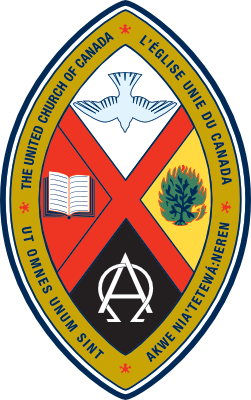The Divine and Life-Changing Water!
Divided tongues, as of fire, appeared among them, and a tongue rested on each of them. (Acts 2: 3) (NRSV).

Sermon by Rev. Andrew K. Lairenge
delivered at Chalmers-Wesley United Church
on Sunday, January 7, 2024.
Scripture selections: Genesis 1: 1-15 / Mark 1: 4-11
On this first Sunday of the year, we begin by reflecting on the baptism of Jesus. Coming right after Christmas, we follow the story of that baby born in a manger. Yesterday was Epiphany, a day that commemorates the presentation of Jesus to the temple by his parents. The significance of Epiphany is that Jesus is revealed as the Messiah. In the temple, we read that Jesus met two important people – a devout Jew named Simeon and an old prophetess called Anna – who declared that Jesus was the Messiah, the one to bring salvation to both the Jews and the Gentiles. (Luke 2:22-39)
After this we follow Jesus who, as an adult, comes to be baptized by John the Baptist in the Jordan River. Baptism for Jesus here becomes the mark of the inauguration of his ministry. It is this baptism event that I wish us to reflect on a little more today. I wish us to think about that one important symbol of baptism, water.
In the Bible, water is a very meaningful element. There is the presence of water in almost every important story when God is about to interact with people. There is a perceivable relationship between water and the spirit of God.
At the very beginning of Genesis, we read that water was the first element that God's spirit interacted with:
"In the beginning God created the heavens and the earth. Now the earth was formless and empty, darkness was over the surface of the deep, and the Spirit of God was hovering over the waters." (Genesis 1:1-2, NIV)
The story of creation begins with God creating the heavens and the earth. The earth though was not well formed. The phrase that is used in Hebrew to describe this formlessness and emptiness of the earth is Tohu wa-bohu. There are various ways to interpret this phrase, such as "void and formless." It represents unmanaged chaos. It is no wonder then that the only place the spirit of God could hang around in this chaos of Tohu wa-bohu was by hovering over the waters. The spirit of God hovered around the water like a child in its mother's womb waiting for the body to be fully formed. Out of this hovering of the spirit of God over the waters, He calls order out of the chaos. God starts arranging things by his word. The first thing he called into order was light and darkness.
"And God said, "Let there be light," and there was light. God saw that the light was good, and he separated the light from the darkness. God called the light "day" and the darkness he called "night." And there was evening, and there was morning – the first day." (Genesis 1: 3-5)
So, if we think about it, the spirit of God hovering over the waters is giving birth to new life on the earth. Therefore, water and the divine spirit are interconnected.
Looking at another important story in the Bible, the redemption of the Children of Israel from Egypt, we see water again playing an important role. We see water right from the birth of Israel's deliverance, as Moses, who is hidden along the banks of the Nile River in a floating basket, is discovered by Pharaoh's daughter who names him Moses, that is "the one pulled out of water." We see water again playing a very important role as Moses parts the Red Sea which marks the final deliverance of the Israelites from Egypt. Paul, writing many years later to the Christians in Corinth, interprets the event this way:
"For I do not want you to be ignorant of the fact, brothers and sisters, that our ancestors were all under the cloud and that they all passed through the sea. They were all baptized into Moses in the cloud and in the sea." (1 Corinthians 10: 1-2, NIV)
For Paul, the crossing of the Red Sea was a form of baptism to the Israelites as they began new lives from slavery into freedom.
It is important to think about the water of baptism even as we think about the baptism of Jesus today. At his baptism, Jesus submits at the feet of John the Baptist who baptizes him with the the rest of the people from Judea who came for the baptism of repentance. The baptism of John was a symbolic act that called people to turn away from their sinful and corrupt ways to a godly life.
For Jesus though, it had an even bigger meaning. According to Mark, John the Baptist tells the people that even though he is baptizing them with water, when the Messiah comes, he will add another element in baptism. The element of the Holy Spirit. John says, "I baptize you with water, but he will baptize you with the Holy Spirit."
This takes us back to the story of creation. Remember at the creation the spirit of God was hovering over the water. It is therefore safe to say that in the water of the baptism of Jesus, the creative spirit of God is right at work again, creating order in a chaotic, sinful and corrupt world that John the Baptist has been trying to clean up. In the baptism of Jesus, we see God calling us into order. We hear God calling us back to the original setting of creation where we are again called God's beloved children. Hence, that reassuring voice to Jesus when God says, "You are my Son, whom I love; with you I am well pleased."
At the baptism of Jesus, we are all called back to God. We are called into healing and renewal. We are called into regeneration and rebirth. We are called to let the old things die and the new things come to life. May we receive that divine water that changes our lives. May we let the water of God soften our hearts like the rain water softens a seed to germinate, ready to bear much fruit. May we be participants in the baptism of Christ. May we embrace that salation that is announced in the baptism of Christ. For in Christ, we are all called God's beloved children.
Amen.

